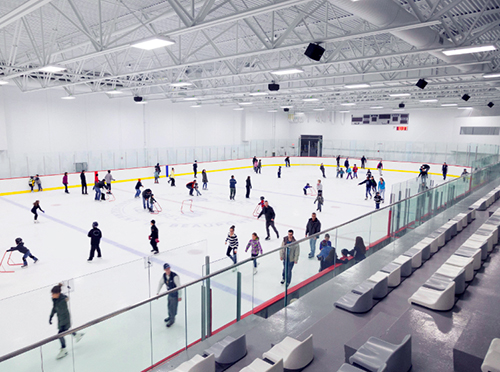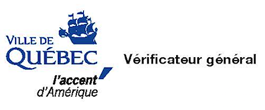
What is this audit about?
In large urban centres like Quebec City, managing the infrastructure required to provide services to residents is a core municipal government mandate. The city’s sports and recreation infrastructure is a good example. Arenas are used for various ice sports such as hockey, figure skating, speed skating, ringette and free skating. Quebec City (“the City”) owns 13 arenas with a total of 17 indoor ice surfaces. In 2015–16, approximately 26,000 ice hours were allocated free of charge to 20 federated ice sports organizations with 8,267 youth registered. About 100 adult groups, with a total of 3,400 participants, also used the City’s ice surfaces.
The purpose of the audit was to determine to what extent the City has achieved an optimal match between its offering of services, city residents’ needs, and available facilities. The audit also explored how to best allocate ice time to maximize use.
What did the audit find?
The audit identified several opportunities to improve day-to-day arena management, particularly in terms of efficiency, that would address unused ice time periods and improve the overall monitoring and coordination of actions. The audit findings are outlined below.
Ice time allocation, fee structure and ice rink use
The audit found the following points:
- Billing errors were identified, including ice hours erroneously allocated free of charge.
- The terms of various boroughs’ agreements with school boards differ, without apparent justification.
- Data on the use and non-use of ice time has generally not been aggregated, resulting in a significant number of hours with no planned activity in the City’s arenas.
- The City’s fee structure is not adjusted based on usage to reflect the fact that some time slots are more difficult to rent than others.
Management of arena operations
The audit identified examples where there was no monitoring of arena operational tasks, which led to considerable variation in the scope and nature of upkeep and maintenance. The audit also found cases where the system for providing mandatory workplace first aid training and updating qualifications for equipment operation was not strictly monitored.
Regulatory and other requirements for arenass
Water cooling towers in arenas and other mechanical equipment must be regularly inspected. The audit found discrepancies in inspection frequency.
The audit presents 17 recommendations that include updating relevant policies, establishing more stringent controls and implementing more efficient, standardized management practices.
What difference did the audit make?
The audit report received considerable media coverage. Arena management is a sensitive topic for Quebec City residents. Following the report, the Mayor of Quebec City promised a “small revolution” in this area, and took the opportunity to present a new vision.
The two City management units with the highest number of recommendations to act upon following the audit—Service des loisirs et des sports (sports and recreation department), and ExpoCité1 (major sports and event complex), both agreed to implement the audit report’s recommendations. In addition, the Direction générale adjointe des services de proximité (office of community services), which oversees most involved stakeholders, has also accepted the report’s recommendations and is committed to change its governance approach. The new governance approach will establish a structure that fosters dialogue and collaboration between the city’s six boroughs and the Service des loisirs et des sports in order to put an end to the practice of managing arenas in silos.
In December 2017 Quebec City Council announced the implementation of a unified management approach for all activities, to be launched no later than January 1, 2019. Responsibilities in the fields of sports, recreation and community life will be grouped together under a single administrative unit. The 650 sports and leisure organizations currently active will be served by dedicated teams in their area of activity. In addition, the sectoral responsibilities of the newly created Service des loisirs, du sport et de la vie communautaire (department of recreation, sports and community life) will be spread throughout the territory, a management method that makes it possible to pool expertise and implement best practices. The objective is to offer quality services consistently throughout the City’s territory. A prolonged, rigorous planning process throughout 2018 was necessary to complete this major administrative restructuring in the municipal government.
What can we learn from this audit?
Observation is a powerful audit tool
Observation is a method of gathering evidence that effectively complements the analyses performed and brings new facts to light. During the audit, the team made multiple visits to the City’s arenas, which afforded the opportunity to observe management practices in action, particularly as regards ice time. The data analysis found a substantial number of hours during which no activity was planned in the City’s arenas, and the audit team’s visits confirmed this fact. Conversely, the audit team observed that some arena users took extra ice time, in addition to what had been allocated to them, yet were not charged for this by the City.
Data quality: A key element
Auditors regularly use data provided by the auditees to perform their analyses. It is critical to assess data quality before using it, to avoid drawing erroneous conclusions. The audit team realized that, although all service providers in each of the City’s boroughs had a computerized system to compile and allocate ice time to various clienteles, two out of six boroughs used Excel spreadsheets instead, meaning that the information available in the computerized system was not up to date for these two boroughs. To have an overview of the hours allocated (or not allocated) in various arenas, the team thus had to compile information from the computer system, for four boroughs, and from Excel spreadsheets, for the other two.
A quality control reviewer with the right skills adds value
It goes without saying that a quality control reviewer must have a good working knowledge of performance audit standards. When this person is also familiar with the business of the audited organization, their contribution adds considerable value at every stage of their involvement. In this case, the quality control reviewer was an experienced CPA and public-sector manager who was well-acquainted with the field, as he himself had played amateur hockey for several years. This professional was thus qualified to provide highly pertinent suggestions on improving planning for the mandate.
Support management findings by documenting repercussions
Audit findings often include points on leadership or coordination. To convincingly document problems of this type, it is useful to demonstrate concrete repercussions. During this audit, one of the team’s key findings was insufficient coordination among stakeholders in certain areas, coupled with a lack of strong leadership. To support these findings, the audit team provided multiple examples of working in silos. In one case, the team identified periods with employees working in arenas where no activities were scheduled; this unused labour could represent up to 360 hours per year in other arenas.
A suitable strategy is needed to validate reports with large numbers of stakeholders
When the report is approved by a large number of stakeholders, it is beneficial to craft a strategy to enhance efficiency by making it easier to obtain de feedback of all audited organizations when time comes to validate the report. Among the strategies the team used was to ask the departments involved to consolidate comments and assign a project owner to be responsible for providing information to the audit team. This also avoids the problem of receiving contradictory information from different departments. In addition, certain departments may not be materially affected by the recommendations, since not all operate in the same way. In such cases, the appropriate instructions for stakeholders is to consider only those recommendations of concern to them, and to leave commenting on other points to those directly concerned.
1ExpoCité is a multi-building fairground and entertainment and exhibition complex in the borough of La Cité-Limoilou. > back to top
See more Featured Audits




